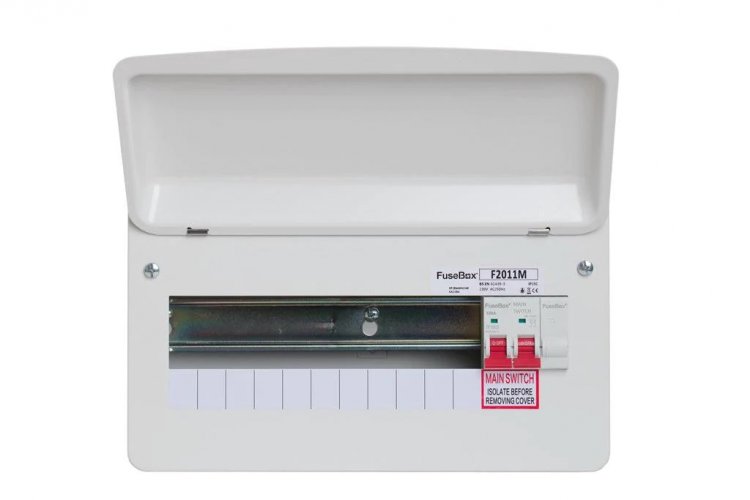The Significance of Setting Up Reliable RCBO CONSUMER UNITS in Your Property
The Significance of Setting Up Reliable RCBO CONSUMER UNITS in Your Property
Blog Article
The Role of Consumer Devices in Effective Power Management Systems
Customer systems are indispensable to reliable power monitoring systems, offering as the key distribution points for electric power within frameworks. The introduction of smart innovations has actually additionally boosted their functionality, permitting for real-time information surveillance and nuanced energy usage analysis.
Understanding Consumer Systems

Recognizing the duty of consumer devices starts with identifying their essential feature in protecting electrical systems. By separating mistakes within particular circuits, customer devices protect against prevalent blackouts and potential fire hazards. This seclusion is achieved through the usage of breaker that journey or fuses that blow when a mistake is found, thus removing the electrical flow to the affected circuit.
In addition, customer devices help with the well organized circulation of power, boosting the efficiency of power use. They enable the organized administration of electrical tons, which can be particularly crucial in commercial and industrial settings where need can change substantially. Effectively conserved customer devices add to the long life of electrical systems and aid in reducing downtime brought on by electric failures, inevitably supporting the smooth operation of energy-dependent facilities.
Smart Technologies Combination

An essential advantage of smart consumer devices is their capability to take advantage of advanced algorithms and equipment learning for anticipating analytics. This permits preemptive modifications based upon usage patterns, weather prediction, and various other variables, significantly raising general efficiency. Clever consumer systems help with demand response programs, where power use can be dynamically readjusted throughout optimal durations to support the grid and minimize costs.
The assimilation of sustainable power sources, such as solar and wind, is also structured with clever consumer units. By smartly managing the intermittency of these resources, these units make sure a well balanced and reputable power supply. Furthermore, wise customer systems improve user interaction by providing detailed understandings and push-button control abilities through mobile applications, cultivating an extra proactive method to energy conservation and sustainability.
Monitoring Energy Consumption
Building on the capabilities of smart technologies integration, checking energy intake becomes an important focus within power monitoring systems. By leveraging advanced metering facilities (AMI), real-time data on power use can be accumulated at granular levels, providing beneficial understandings into usage patterns and peak need periods.
Smart meters and Internet of Points (IoT) tools play a pivotal role in this surveillance procedure. These gadgets can track power use in real-time, sending information to centralized systems for analysis. The gathered data is after that processed via innovative algorithms to find abnormalities, predict future consumption, and recommend optimization techniques. Additionally, cloud-based solutions supply scalable systems for saving and examining huge datasets, facilitating remote surveillance and control.
The assimilation of these innovations not only empowers customers with detailed details concerning their energy usage but also sustains energy companies in handling load distribution better. Eventually, continual and specific tracking is crucial for accomplishing power effectiveness, price savings, and sustainability goals within energy management systems.
Optimizing Home Appliance Use

One effective technique entails recognizing top and off-peak hours to move energy-intensive activities, such as laundry or dishwashing, to times when energy demand is lower. This not just decreases strain on the grid but also profits from reduced energy visit here tolls. Additionally, integrating artificial intelligence formulas permits predictive maintenance, making certain appliances operate at ideal effectiveness and lengthening their life-span.
Power management systems can likewise integrate user-specific choices and habits to tailor device use routines. Wise lights systems can change brightness based on occupancy and natural light accessibility, while HVAC systems can maintain comfort levels without excessive energy use.
Promoting Sustainability
Advertising sustainability within energy management systems entails not just improving performance yet likewise cultivating ecologically accountable practices. Customer devices are integral to this process, as they supply real-time information and control systems that enable customers to keep track of and lower their power consumption. By leveraging sophisticated modern technologies, consumer units can determine energy-saving opportunities and help with the combination of sustainable energy resources like solar and wind power.
One important element of promoting sustainability is informing customers on the benefits of responsible power usage. With in-depth insights offered by consumer systems, individuals can make enlightened choices that lessen their carbon footprint. As an example, these devices can recommend ideal times for running high-energy appliances based on grid demand and sustainable power accessibility, consequently minimizing reliance on nonrenewable fuel sources.
Moreover, customer units sustain the fostering of smart grid modern technologies, which my latest blog post improve the total effectiveness and reliability of power circulation. By making it possible for two-way communication between consumers and energy companies, these systems can dynamically get used to energy needs, decreasing waste and promoting the usage of lasting power techniques.
Verdict
Consumer devices, as essential parts of energy administration systems, significantly enhance electric safety and effectiveness within buildings via circuit protection and clever technology assimilation. Furthermore, the consolidation of renewable energy resources advertises lasting methods, contributing to lowered overall energy consumption and lower carbon impacts.
Advances Learn More in wise modern technologies have transformed the capabilities of energy management systems, especially with the assimilation of smart consumer units.Building on the capabilities of wise technologies combination, keeping track of energy consumption becomes an essential focus within power administration systems.Effective appliance use optimization is a critical part of power administration systems, intending to boost performance and reduce unnecessary power usage.Consumer systems, as important parts of energy monitoring systems, dramatically boost electric safety and security and efficiency within structures via circuit security and wise technology integration. Furthermore, the unification of sustainable energy sources promotes lasting methods, adding to minimized general power consumption and lower carbon footprints.
Report this page